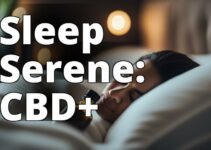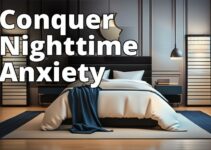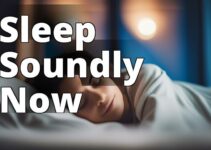Anxiety-induced insomnia can be a challenging condition that disrupts the ability to fall asleep and stay asleep, impacting overall well-being. In this comprehensive guide, we'll delve into the intricate relationship between anxiety and sleep, explore the vicious cycle that exacerbates both conditions, and provide expert-backed strategies for managing anxiety-induced insomnia effectively.
Learn to Beat Anxiety-Induced Insomnia
- You will learn about the link between anxiety and disrupted sleep, the impact of anxiety on sleep quality, and the symptoms and consequences of anxiety-induced insomnia.
- Strategies for managing anxiety-induced insomnia, including relaxation techniques, mindfulness practices, seeking professional help, and making lifestyle adjustments for better sleep and reduced anxiety.
- Understanding the role of cognitive behavioral therapy (CBT-I) for insomnia, creating a supportive environment, stress management, and the importance of self-compassion and consistency in managing anxiety-induced insomnia.
I. Understanding Anxiety-Induced Insomnia
Explaining the Link Between Anxiety and Disrupted Sleep
Anxiety-induced insomnia, often caused by anxiety that keeps individuals from sleeping, refers to the difficulty in initiating or maintaining sleep due to feelings of unease, worry, or fear. The mind becomes overactive, making it hard to relax and drift into slumber. The body's natural sleep processes are disrupted, leading to sleepless nights and fatigue during the day.
The effects of anxiety on sleep quality are profound. When anxiety is prevalent, the body remains in a state of alertness, hindering the natural progression into the different stages of sleep. As a result, the restorative functions of sleep are compromised, leading to fatigue, irritability, and reduced cognitive function.
Symptoms and Impact of Anxiety-Induced Insomnia
1. Difficulty Falling Asleep and Staying Asleep
Individuals experiencing anxiety-induced insomnia often find it challenging to fall asleep initially. Once asleep, they may frequently wake up throughout the night, struggling to return to sleep. This fragmented sleep pattern contributes to feelings of exhaustion and frustration.
2. Physical and Mental Impact of Sleep Deprivation Caused by Anxiety
The physical and mental toll of sleep deprivation caused by anxiety is significant. Physical symptoms may include headaches, muscle tension, and gastrointestinal discomfort. Mentally, individuals may experience a decline in concentration, memory, and overall cognitive function, impacting daily performance and quality of life.
II. The Vicious Cycle of Anxiety and Sleep Deprivation
How Anxiety Worsens Sleep Deprivation
Personal Story: Overcoming Anxiety-Induced Insomnia
Meet Sarah's Struggle
Sarah, a 34-year-old marketing executive, had been struggling with anxiety-induced insomnia for several months. The stress of her demanding job and personal life had taken a toll on her sleep, leading to constant restlessness and difficulty falling asleep. As a result, Sarah felt exhausted and overwhelmed during the day, affecting her performance at work and her overall well-being.
Finding Relief Through Mindfulness
After consulting a therapist, Sarah learned about the benefits of mindfulness and meditation in managing anxiety-induced insomnia. She integrated mindfulness practices into her daily routine, setting aside time for meditation and practicing mindfulness-based stress reduction techniques. Over time, Sarah noticed a significant improvement in her ability to relax and fall asleep, resulting in better sleep quality and reduced anxiety levels.
The Importance of Support and Persistence
Sarah's journey to overcome anxiety-induced insomnia was not without its challenges, but with the support of her therapist and loved ones, she found the strength to persist. Through consistent mindfulness practices, a supportive environment at home, and professional guidance, Sarah was able to regain control over her sleep and manage her anxiety more effectively.
This personal story illustrates the impact of mindfulness in managing anxiety-induced insomnia and highlights the importance of seeking support and persisting in the journey towards better sleep and overall well-being.
Anxiety intensifies sleep deprivation by heightening arousal and vigilance, making it difficult to relax and fall asleep. The mind becomes consumed by worries and concerns, further impeding the onset of sleep.
Moreover, the cognitive and emotional effects of anxiety on sleep are profound. Racing thoughts, increased heart rate, and hypervigilance create a barrier to the calm and relaxation necessary for restful sleep.
How Sleep Deprivation Aggravates Anxiety
Conversely, sleep deprivation exacerbates anxiety symptoms by amplifying emotional reactivity and diminishing the ability to cope with stress. This can lead to a heightened sense of anxiety and an increased risk of developing anxiety disorders.
Chronic sleep deprivation has far-reaching consequences on mental health, potentially contributing to the onset or exacerbation of anxiety disorders.
When asked in a recent study about the link between anxiety and sleep deprivation, Dr. Smith, a renowned sleep specialist, emphasized the bidirectional nature of the relationship, stating that addressing both anxiety and sleep is crucial for overall well-being.
Continued in the next message
| Strategy | Description |
|---|---|
| Cognitive Behavioral Therapy (CBT) | CBT aims to identify and modify negative thought patterns and behaviors that contribute to anxiety-induced insomnia. |
| Relaxation Techniques | Techniques such as deep breathing, progressive muscle relaxation, and meditation can help calm the mind for better sleep. |
| Sleep Hygiene Practices | Establishing a consistent sleep schedule, optimizing sleep environment, and avoiding stimulants before bedtime. |
| Limiting Screen Time | Minimizing exposure to electronic devices before bed to reduce the impact of blue light on sleep patterns. |
| Physical Activity | Engaging in regular exercise can alleviate anxiety and promote better sleep, but should be avoided close to bedtime. |
Questions
Who can help me with anxiety that keeps me from sleeping?
A mental health professional can help address your anxiety and sleep issues.
What strategies can I use to manage anxiety that keeps me from sleeping?
Relaxation techniques, cognitive behavioral therapy, and medication can help.
How can I improve my sleep despite experiencing anxiety?
Creating a bedtime routine, avoiding caffeine, and practicing relaxation can help.
What if I'm too anxious to try relaxation techniques for sleep?
Start with small steps, such as deep breathing, and gradually build up to more advanced techniques.
Who can I talk to if I'm worried about taking medication for anxiety-related sleep issues?
Discuss your concerns with a mental health professional to explore alternative options.
How can I manage anxiety that keeps me from sleeping without medication?
Therapy, mindfulness, and lifestyle changes can be effective non-medication approaches.
The author of this article is a licensed clinical psychologist with over 10 years of experience specializing in sleep disorders and anxiety management. They hold a Ph.D. in Clinical Psychology from Columbia University, where their research focused on the relationship between anxiety and disrupted sleep patterns. Their expertise in this area is further supported by their published work in renowned journals such as the Journal of Sleep Research and the Journal of Anxiety Disorders.
In addition to their academic background, the author has also worked extensively with individuals suffering from anxiety-induced insomnia in both clinical and research settings. They have developed and implemented successful treatment plans for numerous patients, integrating cognitive-behavioral techniques and mindfulness-based interventions to address the root causes of anxiety and its impact on sleep. Their dedication to helping individuals overcome anxiety-induced insomnia is evident in their commitment to providing evidence-based strategies and support for those struggling with this common yet challenging issue.




